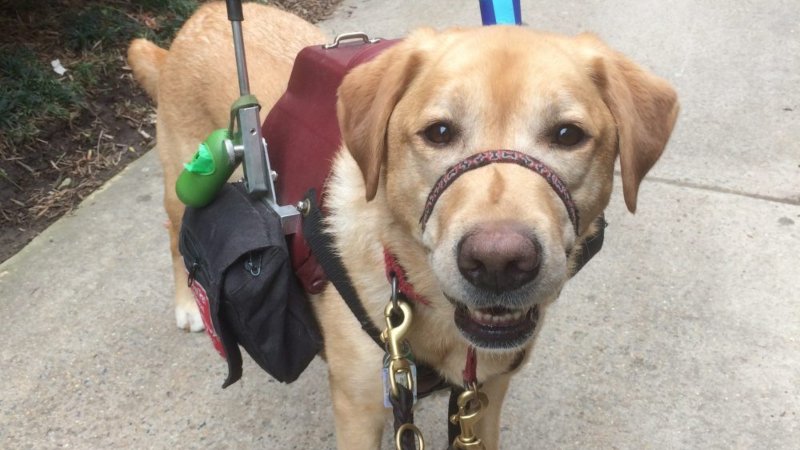
by Toni Popkin
Keeping the following points in mind when meeting or just passing by a service dog team will make a world of difference and the handler will certainly be appreciative.
1) Do not distract the dog or interfere with his job.
In order to perform their jobs to the best of their abilities service dogs must be able to focus on their handler or the task at hand. Even though service dogs are trained to the highest of standards and typically ignore distractions, they are not infallible. A distracted service dog could slip up on a key part of his job and put his partner and himself in danger. Some things that can distract a service dog are:
– Calling to the dog
– Making kissy, barking, or other sounds at the dog
– Petting the dog without permission
Please do not allow young children or your pets to interfere with a service dog team.
2) Do not be offended . . .
A. . . . if a service dog handler will not let you pet his or her dog. Some service dog handlers have a strict “no petting” policy and others don’t. If a handler doesn’t allow petting, it may be because it would prevent the dog from performing his or her job correctly. It is up to the handler to decide, on a case-by-case basis, whether others may pet the service dog.
B. . . . if a service dog handler doesn’t stop to chat. Many service dog handlers are happy to answer respectful questions about their service dogs. However, this may not always be possible, as the handler may be in a hurry, may not feel well, or have other reasons not to be able to stop and talk at that moment.
3). Never offer food to a service dog without first receiving permission from his handler.
Even service dogs can be tempted by food. While service dogs are trained to ignore food on the ground and not to beg when it’s around, food can still serve as a distraction. Furthermore, not all dogs can eat all food, even dog food or dog treats. Feeding a service dog something that can cause an adverse reaction could make the dog sick, which would mean the dog could not work until he is better. This would effectively take away his handler’s independence.
4). Offer help but do not insist.
Service dog handlers are very appreciative of others who ask them if they need any help. If you think a service dog handler may need some help, ask before acting. Do not attempt to take the dog’s leash or harness from the handler and do not attempt to physically move or direct a handler unless he or she has given you permission to do so. If a service dog handler rejects your offer to help, please respect his or her wishes.
5) Treat service dog handlers with dignity.
Speak to the handler, not to the dog. Speak to the handler as you would anyone else and do not ask personal questions about his or her disability.
6) Do not ask a service dog handler to have his or her dog demonstrate a task.
It is in poor taste to ask a service dog handler to cue the dog to demonstrate a task. Service dogs’ jobs revolve around mitigating their handlers’ disabilities, and disabilities are very personal matters. Furthermore, many service dogs do work that is dependent on very specific circumstances that cannot be recreated on a whim.
7) Do not draw unnecessary attention to a service dog team.
Pointing, exclaiming things like “Look, a dog!” and doing other things to make a spectacle of a service dog team are rude and make service dog handlers feel uncomfortable. Allow a service dog handler to go about his or her business just as you would anyone else.
8) Do not photograph or video record a service dog team without permission.
9) Use an encounter with a service dog team as an opportunity to educate children (and adults!) Explain to children what a service dog does and why it is important not to interfere with the team’s work. Also explain that not all disabilities are obvious to others.
—
Previously published on thebrainhealthmagazine
*******************************
***
If you believe in the work we are doing here at The Good Men Project and want to join our calls on a regular basis, please join us as a Premium Member, today.
All Premium Members get to view The Good Men Project with NO ADS.
Need more info? A complete list of benefits is here.
*************************
Photo credit: Toni Popkin


